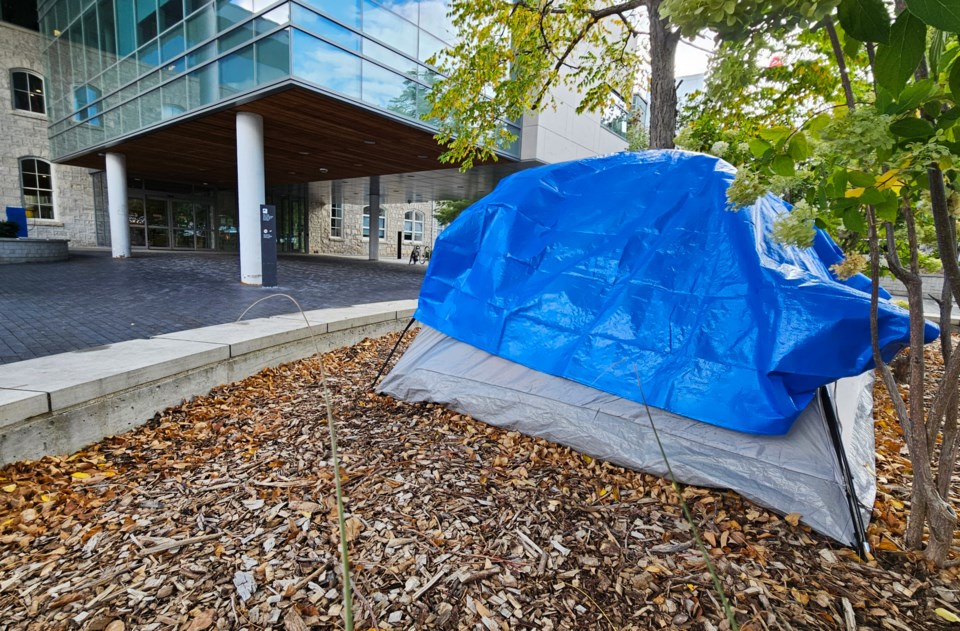Efforts to establish a structured encampment community in Guelph will continue … at least for now.
During a special council meeting on Tuesday, city council unanimously threw its “in principle” support behind the idea, as was requested by Guelph Tiny Homes Coalition (GTHC), though the specific type of structures was intentionally left vague in the motion.
“I think it is the right way of making sure that if we do move something forward, it’s done in the right way,” said Mayor Cam Guthrie. “We need to really lean into this complex need in our community.”
The motion came in response to a GTHC proposal to establish a community of 25 to 50 tiny homes – the model home unveiled earlier this month is 120 sq. ft. – with a shared kitchen, washroom and laundry areas, along with the provision of health, mental health and other wrap-around services residents may need.
That plan calls on the city to fund 45 per cent of the capital cost – estimated at $1.6 million to $2.4 million to build the community initially – with the rest fundraised by the coalition. In addition, annual operating costs pegged at $647,000 would be covered by the city.
However, as coalition member Mike Marcolongo previously noted, residents who receive a housing allotment through government assistance programs could direct those allotments to encampment operations.
That’s what is done at A Better Tented City in Kitchener.
There are many issues that remain to be worked out, coalition and council members acknowledged throughout the meeting. In addition to the location, they include length of stay, a code of conduct, security and whether sanctioned encampments are a temporary solution or a permanent fixture in the overall housing continuum.
Council heard from nine delegations ahead of its vote – all of them urged council to support the coalition’s plan.
“We know this isn’t a perfect solution, there is no perfect solution, but it does represent progress,” offered Helen Fishburn, CEO of the Canadian Mental Health Association Waterloo-Wellington, who delegated alongside Guelph General Hospital CEO Mark Walton and Heather Kerr, executive director of Stonehenge Therapeutic Community.
Several other delegates spoke of their lived experience with homelessness, either past or present.
“We have individuals living in encampments all over our city and our community members are suffering,” said coalition member and outreach worker Ingrid Ohls.
In addition to issues such as frostbite and wound care, Ohls provided examples including malnutrition, an inability to stay dry or clean and people having to carry around their possessions because they have nowhere safe to keep them.
“Many of these situations could have been avoided by having tiny homes,” Ohls said. “Healthcare workers can assist with other health issues focused on substance use (and) can help improve mental health.
“People would have the chance to heal emotionally and physically.”
Danny Lui, a pharmacist who spends time every day visiting encampments throughout the city, noted many people living rough are dealing with childhood trauma.
Morgan Dandie told council she’s been homeless, but sheltered, since June as a result of numerous factors – the dissolution of her marriage, impacts of the pandemic and multiple disabilities.
“I've shared my personal story of falling into homelessness to demonstrate that homelessness is not necessarily equated with addiction and mental health,” Handie said. “There are many like me.”
During Tuesday’s meeting, council called on the federal government to provide immediate funding to address encampment and homelessness-related issues in the community, as generally pledged in the federal budget.
“How much are we getting? Tell us now so we can do the planning now,” Guthrie said, referring to an approved funding increase of $118 million nationally. “The continuous waiting, although we were very pleased that was in the budget, is not helpful.”
In a separate clause, council directed city staff to continue working to identify potential city-owned properties for the development of temporary or permanent housing, and report back to council in the New Year. Non city-owned properties are also to be reviewed if put forward for consideration.
Council further approved a clause asking the County of Wellington to supply cost estimates, including any provincial and federal funding, to provide temporary housing to people on the by-name list not accommodated through other shelter options this upcoming winter.
Those estimates are to be provided to city council for consideration in September.
In a report released last month, Mark Poste, the county’s director of housing, stated there was an average of 198 people experiencing chronic homelessness throughout the county and city during the first quarter of 2024.
The average in 2023 was 149.
Coun. Ken Yee Chew missed Tuesday’s council meeting. Coun. Dan Gibson missed the delegations but was present for the final vote.




.png;w=120;h=80;mode=crop)